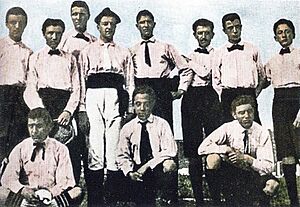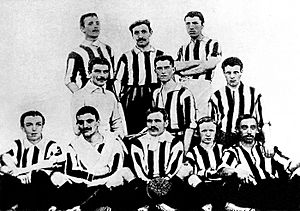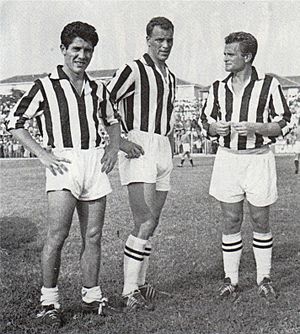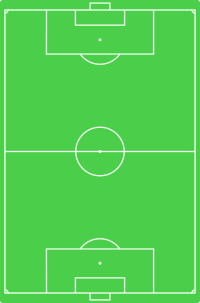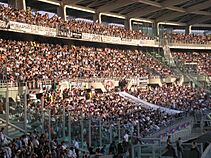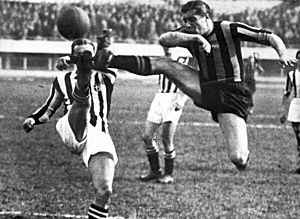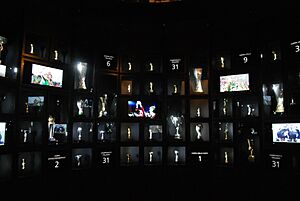Juventus FC facts for kids
 |
|||
| Full name | Juventus Football Club S.p.A. | ||
|---|---|---|---|
| Nickname(s) | La Vecchia Signora (The Old Lady) La Fidanzata d'Italia (Italy's Sweetheart) I Bianconeri (The White and Blacks) Le Zebre (The Zebras) La Gheuba (The Hunchback) |
||
| Short name | Juve | ||
| Founded | 1 November 1897, as Sport-Club Juventus | ||
| Ground | Juventus Stadium | ||
| Capacity | 41,507 | ||
| Owner | Agnelli family (through Exor N.V.) | ||
| President | Gianluca Ferrero | ||
| Head coach | Igor Tudor | ||
| League | Serie A | ||
| 2018–19 | Serie A, 1st of 20 (champions) | ||
|
|
|||
| Traded as | FTSE Italia Mid Cap |
|---|
Juventus Football Club, often called Juventus or Juve, is a famous Italian football club. It is based in Turin, Piedmont, and plays in Serie A, which is the top football league in Italy. A group of students from Turin started the club in 1897. Juventus has played in different stadiums over the years and now plays at Juventus Stadium.
The club is nicknamed la Vecchia Signora ("the Old Lady"). Juventus has won many titles, including 36 official league titles, 15 Coppa Italia trophies, and nine Italian Super Cups. They hold the record for winning all these competitions. On the international stage, Juventus has won two Intercontinental Cups, two European Cup / UEFA Champions Leagues, one European Cup Winners' Cup, three UEFA Cups, two UEFA Super Cups, and one UEFA Intertoto Cup. This makes them one of the most successful clubs in Europe and the world.
Juventus is the second oldest football club still active in Italy. They have played in the top league every season since 1900, except for the 2006–07 season. The Agnelli family, a famous industrial family, has owned the club almost continuously since 1923. This makes their relationship the longest in Italian sports. Juventus became a professional club early on and has been a major force in Italian football since the 1930s. They are often one of the wealthiest football clubs globally.
Under manager Giovanni Trapattoni, Juventus won 13 trophies in ten years before 1986. This included six league titles and five international tournaments. They were the first club to win all three main European competitions: the 1976–77 UEFA Cup, the 1983–84 Cup Winners' Cup, and the 1984–85 European Champions' Cup. Juventus also became the first club in the world to win all five historical international trophies. This achievement was repeated when they won the 1999 UEFA Intertoto Cup.
Juventus has the largest fan base in Italy and one of the largest worldwide. Their fans are spread across Italy and among Italians living abroad. Many famous players have won awards while playing for Juventus. Eight players have won the Ballon d'Or award, and four have won the FIFA World Player of the Year award. Juventus has also provided the most players to the Italy national football team, helping them win the 1934, 1982, and 2006 FIFA World Cups.
Contents
Club History
Early Years and First Wins (1897–1918)
Juventus started as Sport-Club Juventus in late 1897. Students from a school in Turin founded it. Two years later, it was renamed Foot-Ball Club Juventus. The club joined the Italian Football Championship in 1900. Their first match was a 1–0 loss against Torinese on March 11, 1900.
In 1904, a businessman named Marco Ajmone-Marsan helped Juventus financially. This allowed them to move their training field. At first, the team wore pink shirts with a black tie. In 1905, Juventus won their first league title. By then, their colors had changed to black and white stripes, inspired by an English team called Notts County.
In 1906, some people wanted to move the club out of Turin. The club president, Alfred Dick, disagreed and left. He started a new club called FBC Torino, which led to the Derby della Mole rivalry. Juventus spent time rebuilding after this split and survived World War I. In 1913, Juventus was almost relegated but stayed in the top league after the number of teams was increased.
Becoming a Major Force (1923–1980)
In 1922, Juventus opened a new stadium. A year later, Edoardo Agnelli (industrialist), from the FIAT company, became the club's president. These changes helped the club win its second league title in 1926. Juventus became a strong team in the 1930s, winning a record five league championships in a row. Many Juventus players also formed the core of the Italy national football team that won the 1934 FIFA World Cup.
Juventus moved to the Stadio Comunale but struggled to win championships for a while. After World War II, Gianni Agnelli became president. In the late 1940s and early 1950s, the club won two more league titles. In 1957, they signed two new strikers, John Charles and Omar Sívori, who played alongside Giampiero Boniperti. In 1960, they won their first league and cup double. Boniperti retired in 1961 as the club's top scorer.
Juventus won another league title in 1967. The 1970s saw Juventus become even stronger in Italian football. Under coach Čestmír Vycpálek, they won the scudetto (league title) in 1972 and 1973. Players like Roberto Bettega, Franco Causio, and José Altafini were key. They won the league three more times later in the decade under Giovanni Trapattoni. Trapattoni also led them to their first major European title, the 1976–77 UEFA Cup.
European Success (1980–1993)
Under Trapattoni, Juventus won the league three more times by 1984. This meant they had won 20 Italian league titles. They were the first Italian club to add a second golden star to their shirt for this achievement. Paolo Rossi was named European Footballer of the Year in 1982 after helping Italy win the World Cup.
French player Michel Platini won the European Footballer of the Year award three times in a row (1983, 1984, 1985). Juventus became the first club to have players win this award for four consecutive years. Platini scored the winning goal in the 1985 European Cup final against Liverpool. This match was sadly affected by the Heysel Stadium disaster. That year, Juventus became the first club in European football history to win all three major UEFA competitions. After winning the 1985 Intercontinental Cup, they also became the first club to win all five possible international trophies. They repeated this achievement by winning the 1999 UEFA Intertoto Cup.
The late 1980s were not as successful for Juventus. They faced strong teams like Napoli and the Milan clubs. In 1990, under former player Dino Zoff, Juventus won the 1989–90 Coppa Italia and the 1990 UEFA Cup final. They also moved to a new stadium, the Stadio delle Alpi, built for the 1990 FIFA World Cup. Despite signing Italian star Roberto Baggio, the early 1990s brought little success, with only a 1993 UEFA Cup final win.
International Success Returns (1994–2004)
Marcello Lippi became Juventus manager in 1994. In his first season, Juventus won their first Serie A title since the mid-1980s and the 1995 Coppa Italia final. Key players included Ciro Ferrara, Roberto Baggio, Gianluca Vialli, and a young Alessandro Del Piero. Lippi led Juventus to win the 1995 Supercoppa Italiana and the 1995–96 UEFA Champions League, beating Ajax in a penalty shootout.
The club continued to strengthen its team, bringing in players like Zinedine Zidane, Filippo Inzaghi, and Edgar Davids. Juventus won the Serie A title in 1997 and 1998. They also won the 1996 UEFA Super Cup and the 1996 Intercontinental Cup. Juventus reached two more Champions League finals but lost to Borussia Dortmund in 1997 and Real Madrid in 1998.
Lippi returned to the club in 2001. He signed big names like Gianluigi Buffon, David Trezeguet, Pavel Nedvěd, and Lilian Thuram. This helped the team win Serie A titles in 2002 and 2003. Juventus also reached an all-Italian 2003 UEFA Champions League final but lost to Milan on penalties. After the next season, Lippi became the Italy national team coach, ending a very successful period for Juventus.
Challenges and Rebuilding (2004–2011)
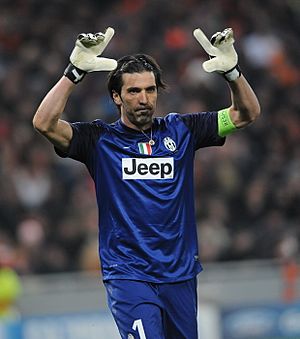
In 2004, Fabio Capello became head coach and led Juventus to first place in the 2004–05 and 2005–06 Serie A seasons. However, in May 2006, Juventus was involved in a major investigation into alleged sporting misconduct. As a result, in July 2006, the club was moved down to Serie B for the first time in its history. They were also stripped of their 2004–05 Serie A title, and the 2005–06 title was given to Inter Milan.
Many key players left after the club was moved to Serie B, including Thuram and Zlatan Ibrahimović. However, important players like Del Piero, Buffon, Trezeguet, and Nedvěd stayed to help the club. Young players from the youth team, like Sebastian Giovinco and Claudio Marchisio, also joined the main team. Juventus won the Serie B championship in the 2006–07 season and quickly returned to Serie A. Del Piero was the top scorer that season.
After returning to Serie A in 2007, Juventus appointed Claudio Ranieri as manager. They finished third in their first season back and qualified for the Champions League. Ranieri was later replaced by Ciro Ferrara, who was then replaced by Alberto Zaccheroni. These managers struggled to bring consistent success, and Juventus finished seventh in Serie A in 2010. In 2010, Andrea Agnelli became the club's president. He brought in Luigi Delneri as manager, who was later replaced by former player Antonio Conte. In September 2011, Juventus moved to their new home, the Juventus Stadium, which is now known as the Allianz Stadium.
Nine Straight League Titles (2011–2020)
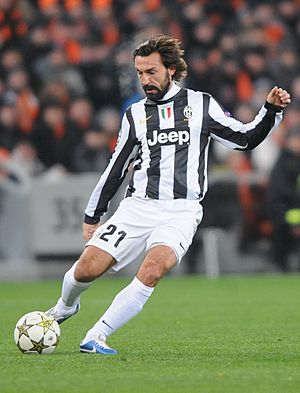
With Antonio Conte as manager, Juventus had an amazing 2011–12 Serie A season, going unbeaten. They won the title on the 37th matchday. This made Juventus the first team to go an entire 38-game season without losing. In the 2013–14 Serie A season, Juventus won their third consecutive league title with a record 102 points and 33 wins. This was the club's 30th official league championship.
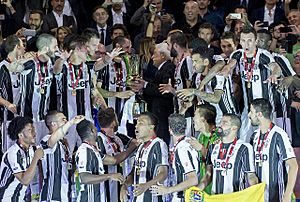
In the 2014–15 Serie A season, Massimiliano Allegri became manager. Juventus won their 31st official title, making it four in a row. They also won a record tenth Coppa Italia, completing a domestic double. Juventus reached the 2015 UEFA Champions League final but lost to Barcelona. In 2016, they won the Coppa Italia for the 11th time, becoming the first team in Italy to win both the Serie A and Coppa Italia in back-to-back seasons. They continued this success, winning the Coppa Italia three more times in a row, setting a new record. On May 21, 2017, Juventus became the first team to win six consecutive Serie A titles. They reached another Champions League final in 2017 but lost to Real Madrid. In 2018, Juventus won their 13th Coppa Italia title and their seventh consecutive Serie A title, extending their record.
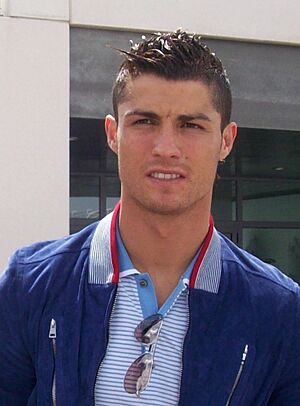
To try and win the Champions League, Juventus signed Cristiano Ronaldo from Real Madrid in July 2018. This was a huge deal for the club, not just for football but also to boost their global business status. In January 2019, Juventus won their eighth 2018 Supercoppa Italiana title. In April 2019, they secured their eighth consecutive Serie A title. After Allegri left, Maurizio Sarri became manager. Juventus won their ninth consecutive league title in the 2019–20 Serie A season, an amazing achievement.
Recent Seasons (2020–Present)
On August 8, 2020, Sarri was replaced by former player Andrea Pirlo as coach. In the 2020–21 Serie A season, Juventus's run of nine consecutive titles ended when Inter Milan won the league. Juventus finished fourth, which allowed them to qualify for the Champions League. Pirlo won the Coppa Italia and Supercoppa Italiana but was replaced by Allegri in May 2021. Cristiano Ronaldo left the club in August 2021.
In the 2021–22 Juventus F.C. season, Juventus finished fourth in the league again. They lost the 2022 Coppa Italia final to Inter Milan, meaning they did not win a trophy for the first time since 2010–11. In the 2022–23 Juventus FC season, Juventus had a tough Champions League group stage. The entire board of directors, including president Andrea Agnelli, resigned in November 2022. Gianluca Ferrero was appointed as the new chairman.
In January 2023, Juventus was deducted 15 points in Serie A due to financial rule violations. This decision was later changed to a 10-point deduction in May. Juventus also received a fine for other accounting issues. They finished seventh in the 2022–23 Serie A and qualified for the Europa Conference League. However, UEFA banned Juventus from its competitions for one year in July 2023. This meant Juventus did not play in any UEFA competitions during the 2023–24 Juventus FC season.
In the 2023-24 Serie A season, Juventus finished third. They won the 2023-24 Coppa Italia by beating Atalanta 1–0, with a goal from Dušan Vlahović. This was Allegri's only trophy in his second time as manager. Allegri was sent off during the final for his behavior. Two days later, Juventus announced they had sacked Allegri because his actions did not match the club's values. Paolo Montero took charge for the final two league games.
On June 12, 2024, Juventus announced that Thiago Motta would be their new head coach for the 2024–25 Juventus FC season. Juventus spent a lot of money on new players like Teun Koopmeiners and Douglas Luiz. However, Motta was sacked in March 2025 and replaced by Igor Tudor.
Club Identity
Crest and Colors
Juventus has played in black and white striped shirts with white or black shorts since 1901. Before that, they wore pink shirts. The club changed to black and white after their original pink shirts faded. An English team member, John Savage, found a friend in Nottingham who was a fan of Notts County F.C.. This friend sent over the black and white striped shirts, and Juventus has worn them ever since. The club sees these colors as strong and powerful.
The Juventus emblem has changed a few times since the 1920s. The emblem used until 2017 was a black-and-white oval shield with five vertical stripes. The club's name was at the top. At the bottom, there was a white outline of a charging bull, which is a symbol of Turin. There was also a black crown above the bull, representing Turin's ancient Roman history.
In January 2017, President Andrea Agnelli announced a new, simpler Juventus logo. It is a stylized black and white "J" shape. Juventus was the first sports team to use a star to show championship wins. They added one above their badge in 1958 for their tenth Italian league title. Other clubs have since started using stars too.
In the past, the emblem had a blue section and the bull and crown were larger. The "Golden Stars for Sport Excellence" were above the emblem. In the 1980s, the club's emblem was a blurred zebra silhouette with two golden stars.
Juventus unofficially won their 30th league title in 2011–12. However, due to a past scandal, the Italian Football Federation (FIGC) had stripped them of their 2004–05 title and did not give them the 2005–06 title. So, their official total was 28. The club chose not to wear stars in the 2012–13 Serie A season but added "30 sul campo" ("30 on the pitch") under the badge. Juventus officially won their 30th title in 2013–14, earning the right to wear a third star. For the 2015–16 Juventus FC season, Juventus brought back the stars and added the third one to their jersey.
In September 2015, Juventus launched a project called JKids for young fans. They also introduced a new mascot named J, a cartoon zebra with black and white stripes and golden stars. J first appeared at Juventus Stadium on September 12, 2015.
The club has many nicknames. La Vecchia Signora (the Old Lady) is the most famous. "Old" is a playful twist on "Juventus," which means "youth" in Latin. "Lady" is how fans lovingly referred to the club. Another nickname is la Fidanzata d'Italia (Italy's Sweetheart). This is because many Italian immigrant workers, especially from Southern Italy, supported Juventus when they moved to Turin for work. Other nicknames include i bianconeri (the black-and-whites) and le zebre (the zebras) because of their colors. I gobbi (the hunchbacks) is a nickname for Juventus supporters and sometimes players. It might come from the large jerseys players wore in the 1950s, which would bulge out when they ran.
The official song of Juventus is Juve (storia di un grande amore) (Juve, story of a great love). It was written in 2007. Several documentaries and docu-series have been made about the club, including Black and White Stripes: The Juventus Story (2016), First Team: Juventus (2018) on Netflix, and All or Nothing: Juventus (2021) on Amazon Prime.
Stadiums
|
Allianz Stadium
|
|
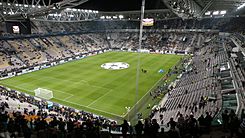 |
|
| Location | Corso Gaetano Scirea, 10151 Turin, Italy |
|---|---|
| Owner | Juventus F.C. |
| Operator | Juventus F.C. |
| Capacity | 41,507 seated |
| Construction | |
| Broke ground | 1 March 2009 |
| Opened | 8 September 2011 |
| Construction cost | €155,000,000 |
| Architect | Hernando Suarez, Gino Zavanella, Giorgetto Giugiaro |
After its first two years, Juventus played at the Piazza d'Armi Stadium until 1908. They also played at the Corso Re Umberto stadium in 1905 and 1906.
From 1909 to 1922, Juventus played at the Corso Sebastopoli Camp. Then they moved to Corso Marsiglia Camp, where they stayed until 1933 and won four league titles. In late 1933, they started playing at the new Stadio Benito Mussolini. This stadium was built for the 1934 FIFA World Cup. After World War II, it was renamed Stadio Comunale Vittorio Pozzo. Juventus played home matches there for 57 years.
From 1990 until the 2005–06 season, Juventus played at Stadio delle Alpi. This stadium was also built for the 1990 FIFA World Cup. Sometimes, the club played home games in other stadiums.
In August 2006, Juventus returned to play in the Stadio Comunale, which was then called Stadio Olimpico. In November 2008, Juventus announced plans to build a new stadium, the Juventus Stadium. It was built on the site of the old delle Alpi stadium. Unlike the old stadium, the new one has no running track, and the pitch is very close to the stands. It can hold 41,507 fans. Construction began in 2009, and the stadium opened on September 8, 2011. Since July 1, 2017, Juventus Stadium has been known as the Allianz Stadium of Turin.
Supporters
Juventus is the most supported football club in Italy, with over 12 million fans. This is about 34% of all Italian football fans. They are also one of the most supported clubs worldwide, with over 300 million supporters. Many fans are in countries where Italian people have moved. Juventus has fan clubs all over the world.
There is high demand for Juventus tickets even when they play away from Turin. This shows that Juventus has strong support across Italy, especially in Southern Italy, Sicily, and Malta. They often have more fans at away matches than in Turin itself.
Club Rivalries
Juventus has big rivalries with two main clubs.
Their traditional rivals are Torino, another club from Turin. Matches between them are called the Derby della Mole (Turin Derby). This rivalry started in 1906 when Torino was founded by former Juventus players and staff.
Their most famous rivalry is with Inter Milan, a big club from Milan. Matches between these two clubs are known as the Derby d'Italia (Derby of Italy). These two teams often compete for the top spot in the league. Until the 2006 scandal, they were the only Italian clubs that had never played below Serie A. They are the first and second most supported clubs in Italy, and their rivalry has grown stronger since the late 1990s.
The rivalry with AC Milan is between two of the most successful and supported teams in Italy. Matches between Milan and Juventus are often seen as championship deciders.
Juventus also has rivalries with Roma, Fiorentina, and Napoli.
Youth Program
The Juventus youth system is known as one of the best in Italy for developing young talent. Many players who came through the youth system have gone on to have successful careers in Italian football. The Primavera (under-19) squad had a very successful period from 2004 to 2006, winning many age-group competitions. Juventus also has football schools and camps outside Italy to find new talent.
In 2018, Juventus started a professional reserve team called Juventus U23 (now Juventus Next Gen). This team plays in Serie C. In 2020, they won the Coppa Italia Serie C. In 2022, the U19 squad reached the semi-finals of the UEFA Youth League, which was the best result for a Serie A team in that competition.
The youth system has also provided many players for the Italian national team. Famous players like Gianpiero Combi, Pietro Rava, Giampiero Boniperti, Roberto Bettega, Paolo Rossi, Claudio Marchisio, and Sebastian Giovinco all came from the Juventus youth system.
Players
First-team squad
|
|
Out on loan
|
|
Other players under contract
|
|
Coaching Staff
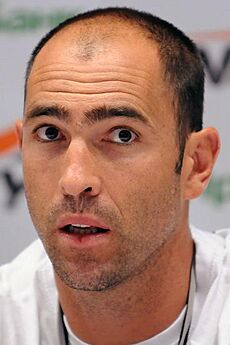
| Position | Staff |
|---|---|
| Head coach | |
| Assistant coach | |
| Technical collaborator | |
| Goalkeeping coaches | |
| Athletic coach | |
| Head of match analysis | |
| Head of conditioning and sport science | |
| Sport science collaborator | |
| Head of medical | |
| Club doctor | |
| Physiotherapists |
Club Presidents
Juventus has had 24 presidents and two administrative committees since it was founded. The Agnelli family has often held leadership roles in the club.
|
|
Club Managers
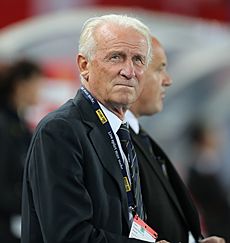
Here is a list of Juventus managers from 1923, when the Agnelli family took over the club.
|
|
Club Achievements
Juventus is Italy's most successful club of the 20th century. They have won the Italian League Championship a record 36 times. They also hold the record for winning nine consecutive titles (from 2011–12 to 2019–20). Juventus has won the Coppa Italia (Italy's main cup competition) a record 15 times. They were the first team to win it three times in a row (2014–15 to 2016–17) and then a fourth consecutive time in 2017–18. The club also holds the record for Supercoppa Italiana wins with nine titles.
In total, Juventus has won 71 official competitions, more than any other Italian club. This includes 60 national titles and 11 international titles. They are among the top clubs in Europe and the world for international titles. In 1977, Juventus became the first club in Southern Europe to win the UEFA Cup. In 1993, they won their third UEFA Cup, a record at the time. Juventus was also the first Italian club to win the UEFA Super Cup (in 1984) and the Intercontinental Cup (in 1985).
The club is allowed to wear three golden stars on its shirts. Each star represents ten league victories. They earned their first star in 1958, their second in 1982, and their third in 2014. Juventus was the first Italian team to win the national double (league and cup in the same season) four times. They achieved this in 1959–60, 1994–95, 2014–15, and 2015–16. They then won two more consecutive doubles in 2016–17 and 2017–18.
Juventus is unique in the world for having won all official European club competitions. They received The UEFA Plaque from UEFA in 1988 for this achievement. In 2000, FIFA ranked Juventus seventh among the best clubs in the world. Nine years later, they were ranked the second-best club in Europe during the 20th century.
| Type | Competitions | Titles | Seasons |
|---|---|---|---|
| Domestic | Serie A | 36 | 1905, 1925–26, 1930–31, 1931–32, 1932–33, 1933–34, 1934–35, 1949–50, 1951–52, 1957–58 ( |
| Serie B | 1 | 2006–07 | |
| Coppa Italia | 15 | 1937–38, 1941–42, 1958–59, 1959–60, 1964–65, 1978–79, 1982–83, 1989–90, 1994–95, 2014–15, 2015–16, 2016–17, 2017–18, 2020–21, 2023–24 | |
| Supercoppa Italiana | 9 | 1995, 1997, 2002, 2003, 2012, 2013, 2015, 2018, 2020 | |
| Continental | European Cup / UEFA Champions League | 2 | 1984–85, 1995–96 |
| UEFA Cup Winners' Cup | 1 | 1983–84 | |
| UEFA Cup / UEFA Europa League | 3 | 1976–77, 1989–90, 1992–93 | |
| European Super Cup / UEFA Super Cup | 2 | 1984, 1996 | |
| UEFA Intertoto Cup | 1 | 1999 | |
| Worldwide | Intercontinental Cup | 2 | 1985, 1996 |
- record
- s shared record
Club Statistics and Records
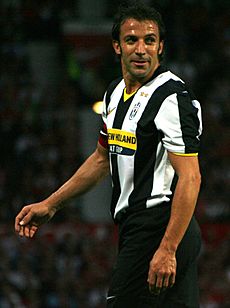
Alessandro Del Piero holds the record for most appearances for Juventus, with 705 games. He also has the record for Serie A appearances with 478. Del Piero is the all-time leading goalscorer for Juventus, with 290 goals. Giampiero Boniperti is second with 182 goals. In the 1933–34 season, Felice Borel scored 31 goals in Serie A, a club record for a single season. Ferenc Hirzer scored 35 goals in 24 games in the 1925–26 season, the most by a player in a single season. The most goals scored by a player in one match is 6, achieved by Omar Sívori in 1960–61. This is also an Italian record.
Juventus's first official game was in the 1900 Italian Football Championship, where they lost 0–1 to Torinese. Their biggest victory was 15–0 against Cento in the 1926–27 Coppa Italia. In the league, Juventus famously beat Fiorentina and Fiumana 11–0 in the 1928–29 season. Juventus's biggest league defeats were 1–8 against Milan in 1912 and 0–8 against Torino in 1913.
The transfer of Gianluigi Buffon to Juventus in 2001 cost €52 million. This made him the most expensive goalkeeper at the time. On March 20, 2016, Buffon set a new Serie A record for the longest time without letting in a goal (974 minutes). In 2016, Gonzalo Higuaín joined Juventus for €90 million, which was the highest transfer fee for an Italian club at the time. In 2016, Paul Pogba returned to Manchester United for €105 million, which was a world record transfer fee then. The sale of Zinedine Zidane from Juventus to Real Madrid in 2001 for around €77.5 million was also a world record at the time. In 2018, Cristiano Ronaldo became the highest transfer for an Italian club when he joined Juventus for €100 million.
UEFA Club Ranking
| Rank | Team | Points |
|---|---|---|
| 1 | 134.000 | |
| 2 | 126.000 | |
| 3 | 122.000 | |
| 4 | 120.000 | |
| 5 | 120.000 | |
| 6 | 115.000 | |
| 7 | 113.000 |
Contribution to the Italy National Team
Juventus has provided more players to the Italy national football team than any other club in history. They are the only Italian club to have had players in every Italy national team since the 1934 FIFA World Cup. Many Juventus players have helped Italy win the World Cup.
Here are Juventus players who were part of Italy's World Cup winning teams:
- 1934 FIFA World Cup (9 players): Gianpiero Combi, Virginio Rosetta, Luigi Bertolini, Felice Borel IIº, Umberto Caligaris, Giovanni Ferrari, Luis Monti, Raimundo Orsi and Mario Varglien Iº
- 1938 FIFA World Cup (2 players): Alfredo Foni and Pietro Rava
- 1982 FIFA World Cup (6 players): Dino Zoff, Antonio Cabrini, Claudio Gentile, Paolo Rossi, Gaetano Scirea and Marco Tardelli
- 2006 FIFA World Cup (5 players): Fabio Cannavaro, Gianluigi Buffon, Mauro Camoranesi, Alessandro Del Piero and Gianluca Zambrotta
Two Juventus players, Paolo Rossi (1982) and Salvatore Schillaci (1990), won the golden boot award at the World Cup. Also, Alfredo Foni and Pietro Rava won gold medals with Italy at the 1936 Summer Olympics.
Seven Juventus players were on the Italy team that won the 1968 European Championship. Four players were on the team that won the UEFA Euro 2020: Giorgio Chiellini, Leonardo Bonucci, Federico Bernardeschi, and Federico Chiesa.
Juventus has also contributed players to other national teams. Zinedine Zidane and Didier Deschamps were Juventus players when they won the 1998 World Cup with France. Blaise Matuidi also won the 2018 World Cup with France. Argentines Ángel Di María and Leandro Paredes won the 2022 World Cup. This makes Juventus the club that has supplied the most FIFA World Cup winners globally (27). Three Juventus players have also won the European Championship with other nations: Luis del Sol (Spain, 1964), Michel Platini (France, 1984), and Zidane (France, 2000).
Financial Information
 |
|||||||
| Public (Società per azioni) | |||||||
| Traded as |
|
||||||
| Predecessor |
|
||||||
| Founded | Turin, Italy (August 1949, as società a responsabilità limitata) | ||||||
|
Key people
|
|
||||||
| Revenue |
|
||||||
|
Operating income
|
|
||||||
|
|||||||
| Total assets |
|
||||||
| Total equity |
|
||||||
| Owner |
|
||||||
|
Number of employees
|
|
||||||
Juventus became one of the first professional sports clubs in Italy in 1923. The Agnelli family has owned the club for a very long time. Juventus was listed on the Italian stock exchange in 2001. This means parts of the club can be bought and sold like shares in a company.
Juventus is one of the most valuable football clubs in the world. In May 2024, Forbes estimated its value at over US$2 billion. In 2016, it became the first football club in Italy to be worth over one billion euros. According to Deloitte, Juventus is one of the highest-earning football clubs globally.
Multisport Activities
Juventus has been involved in various sports over the years. When it started, it had sections for cycling, athletics, wrestling, and running.
In the 1920s, Juventus expanded into other sports like bowls, swimming, ice hockey, and tennis. Their tennis section was very successful. In the late 1960s, a skiing section was also created.
In the 2017–2018 season, Juventus started a women's football team. This team won the Serie A women's championship in their first season. They were the first Italian club to win both the men's and women's national football championships at the same time. They continued this success for the next two seasons.
Since 2019, the club has an eSports section. In 2021, their eSports team won the eFootball.Pro, a major eSports competition. They also won the TIMVISION Cup | eSports Edition, which was the first digital Italian Cup. In 2023, playing as Juventus Dsyre, they won their first Italian championship title in the eSerie A TIM, the virtual version of Serie A.
Images for kids
See also
 In Spanish: Juventus de Turín para niños
In Spanish: Juventus de Turín para niños


